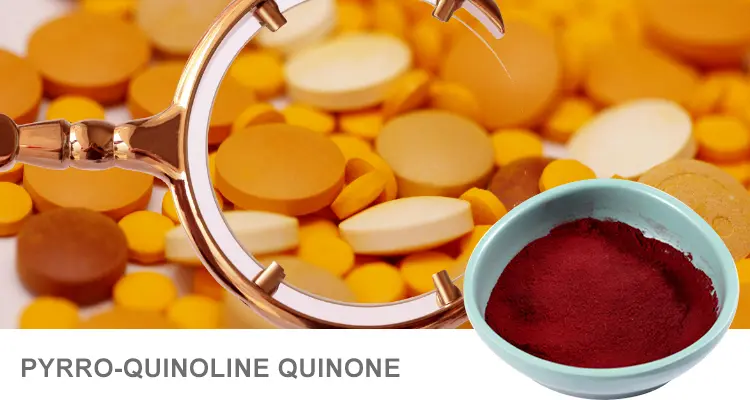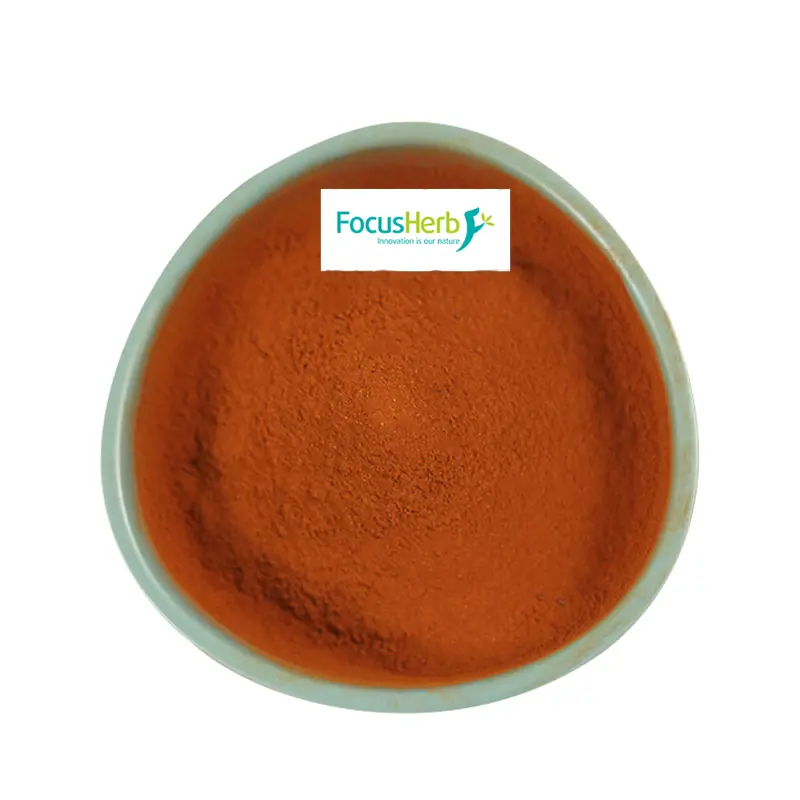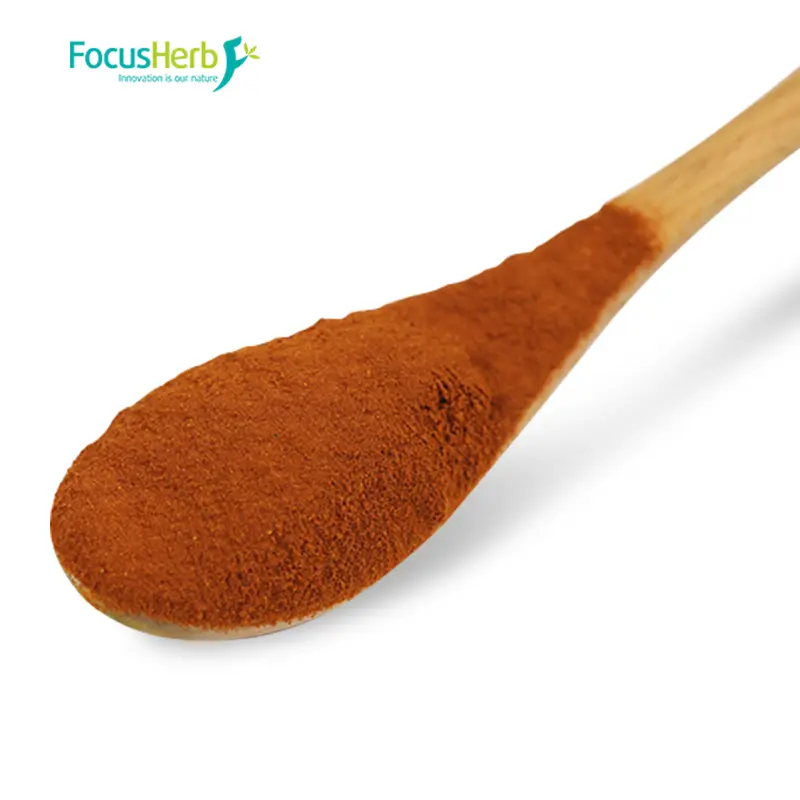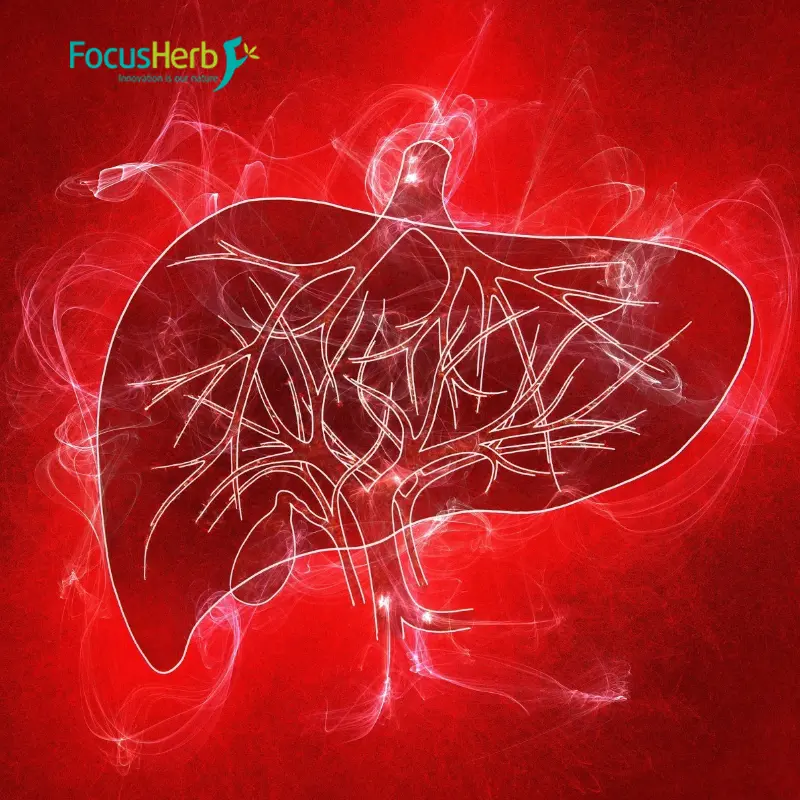In recent years, a substance called PQQ (pyrroloquinoline quinone) has rapidly gained popularity in the health field, becoming a focal point for health enthusiasts and researchers. Many consider it a “magic key” to unlocking the secrets of good health. What is so unique about it that makes it stand out among so many other nutritional ingredients? Is it simply hype, or does it truly possess miraculous benefits? Let’s demystify PQQ and explore the scientific secrets behind it.
What is PQQ?
(I) Unique Chemical Structure
PQQ, also known as pyrroloquinoline quinone, typically appears as a red, crystalline powder. This unique chemical structure gives PQQ its remarkable biological activity and underlies its crucial role in numerous physiological processes. The pyrrole ring, quinoline ring, and quinone structure within the PQQ molecule together form a stable and highly active chemical system. In chemical reactions, PQQ’s quinone structure can accept and donate electrons, participating in redox reactions, acting as an efficient electron transfer “transfer station.” This property makes it an indispensable player in cellular energy metabolism. For example, during cellular respiration, PQQ participates in the electron transport chain, helping cells more efficiently convert nutrients into energy, providing sufficient power for various cellular activities. Furthermore, its unique molecular structure enables it to interact with specific biomacromolecules such as proteins and enzymes. Through precise molecular recognition, it activates or regulates related biological processes, thus profoundly affecting cell growth, development, and differentiation.
(II) A Natural Treasure House
PQQ is widely found in various foods in nature. While its concentrations vary, its distribution is extensive. Among common foods, green vegetables like spinach and broccoli are “natural reservoirs” of PQQ. Spinach contains approximately 23.7μg of PQQ per 100g, and broccoli also contains a considerable amount, approximately 18.9μg per 100g. Among fruits, kiwifruit is a PQQ goldmine, containing approximately 11.3μg of PQQ per 100g of flesh, offering a natural source of PQQ for fruit lovers. Animal-derived foods, such as meat and dairy products, also contain certain amounts of PQQ. Beef contains approximately 10.8μg per 100g, and while milk contains a relatively low amount, it still provides a significant supplement. Furthermore, fermented foods, such as natto, are also excellent sources of PQQ, boasting a PQQ content of up to 61.0μg per 100g, making it a significant source among common foods.
Unfortunately, the human body cannot synthesize PQQ on its own, meaning we must rely on external sources for this essential substance. However, due to its generally low content in food, it is difficult to meet the body’s full PQQ needs through diet alone. Taking the 10-20mg PQQ supplement dosage commonly used in research as an example, to obtain this much PQQ from spinach alone, one would need to consume approximately 422-844kg of spinach daily, which is clearly unrealistic. Therefore, for those who wish to fully utilize the health benefits of PQQ, appropriate nutritional supplementation is a reasonable and effective option.
The Outstanding Benefits of PQQ

(I) Pioneer in Antioxidant Function
Free radicals are constantly generated during the human body’s metabolic process. These free radicals, like restless “troublemakers,” are highly reactive and constantly threaten cellular health. When free radical production exceeds the body’s ability to eliminate them, oxidative stress ensues, a runaway “oxidative storm” that attacks various biomolecules within cells, such as DNA, proteins, and lipids, damaging cellular structure and function and leading to a range of health problems, including aging, cardiovascular disease, and neurodegenerative diseases.
PQQ is a “superhero” in the fight against free radicals and oxidative stress. Its molecular structure imparts powerful antioxidant properties, acting like an “electron sponge” to directly capture and neutralize free radicals, converting these dangerous “troublemakers” into stable substances, thereby reducing their attack and damage to cells. Studies have shown that PQQ is extremely efficient at scavenging free radicals. Under certain experimental conditions, its ability to scavenge common free radicals, such as superoxide anion radicals and hydroxyl radicals, even exceeds that of traditional antioxidants such as vitamin C and vitamin E. In addition to directly scavenging free radicals, PQQ can also enhance cells’ antioxidant capacity by activating the intracellular antioxidant defense system. Acting like a “commander,” it activates the Nrf2/ARE signaling pathway and upregulates the activity of antioxidant enzymes such as superoxide dismutase (SOD) and glutathione peroxidase (GPx). These antioxidant enzymes act as cellular “defense guards,” working synergistically to combat free radical damage. For example, SOD converts superoxide anion radicals into hydrogen peroxide, while GPx further reduces hydrogen peroxide to water, effectively scavenging free radicals and maintaining intracellular redox balance. In a study on mice, PQQ supplementation significantly increased SOD and GPx activity, and significantly reduced levels of malondialdehyde (MDA), a marker of oxidative stress, demonstrating PQQ’s remarkable effectiveness in enhancing the antioxidant defense system.
(II) Guardians of Mitochondria
Mitochondria, known as the “energy factories” of cells, play a vital role in cellular life. Through a series of complex biochemical reactions, mitochondria convert chemical energy from food into a form of energy that can be directly utilized by cells—adenosine triphosphate (ATP). This provides a continuous source of energy for various physiological activities, including cell growth, division, and movement. Mitochondria also participate in important processes such as apoptosis and metabolic regulation, playing a key role in maintaining normal cellular function and internal environmental stability.
PQQ plays an irreplaceable role in promoting mitochondrial growth and development and enhancing energy metabolism. It activates PGC-1α (peroxisome proliferator-activated receptor γ coactivator 1α), a key protein known as the “master switch” of mitochondrial biogenesis. Once activated, PGC-1α activates a series of genes that promote mitochondrial biogenesis, essentially turning on the mitochondrial “production plant.” This increases the number and quality of mitochondria within the cell, thereby enhancing mitochondrial function. Studies have found that supplementing with PQQ significantly increases mitochondrial density and ATP production within cells. For example, in an experiment on liver cells, treatment with PQQ increased the number of mitochondria by approximately 30% and ATP production by 1.5-fold, indicating a significant improvement in the efficiency of cellular energy metabolism. PQQ also optimizes the function of the mitochondrial electron transport chain. The electron transport chain is a key step in mitochondrial ATP production, acting as an efficient “energy production line.” As a coenzyme for enzymes such as lactate dehydrogenase (LDH), PQQ participates in the electron transport process, accelerating the conversion of NADH (reduced coenzyme I) to NAD⁺ (oxidized coenzyme I), promoting pyruvate production, and thereby enhancing glucose metabolism efficiency. This allows the electron transport chain to operate more smoothly and increases ATP production efficiency. In bacterial models, PQQ has been shown to be a key cofactor of the electron transport chain, playing a vital role in maintaining bacterial energy metabolism. In human cells, PQQ similarly optimizes the function of the electron transport chain, providing cells with more energy and ensuring normal cellular activity.
(III) A Multifaceted Health Supporter
1. A Solid Shield for the Cardiovascular System
The cardiovascular system is like the human body’s “transportation network.” The heart is the “power pump” of this network, and the blood vessels are the crisscrossing “roads,” responsible for transporting oxygen and nutrients to every tissue and organ in the body, maintaining normal physiological functions. However, unhealthy habits in modern life, such as a high-salt, high-fat diet, lack of exercise, chronic mental stress, and factors such as aging, can damage the cardiovascular system, leading to a series of cardiovascular diseases such as atherosclerosis, coronary heart disease, and hypertension, which seriously threaten people’s health and life.
PQQ excels in protecting cardiovascular health through multiple mechanisms of action. Firstly, PQQ’s powerful antioxidant capacity effectively scavenges free radicals within blood vessels, reducing oxidative stress damage to endothelial cells. Endothelial cells act like a protective membrane lining the blood vessels. Once damaged, vascular permeability increases, making it easier for lipids in the blood to deposit on the vessel walls, forming atherosclerotic plaques. PQQ scavenges free radicals, reduces the oxidation of oxidized low-density lipoprotein (LDL), and inhibits lipid peroxidation, thereby reducing the risk of atherosclerosis. Studies have shown that in vitro, PQQ can significantly reduce the oxidative modification of LDL and inhibit the damage of oxidized LDL to vascular endothelial cells.
PQQ also has anti-inflammatory properties. Inflammation plays a key role in the development of cardiovascular disease. It leads to inflammatory cell infiltration of the blood vessel wall, promotes the formation and progression of atherosclerotic plaques, increases the risk of plaque rupture, and ultimately triggers acute cardiovascular events. PQQ can inhibit the production of inflammatory factors such as tumor necrosis factor-α (TNF-α) and interleukin-6 (IL-6), alleviating chronic inflammation and protecting cardiovascular tissue from inflammatory damage. Clinical studies have found that PQQ supplementation reduced IL-6 levels in patients with chronic inflammation by approximately 27%, demonstrating its significant effectiveness in reducing inflammation. In addition, PQQ improves energy metabolism within cardiomyocytes and enhances their antioxidant capacity by regulating mitochondrial membrane potential, promoting the activity of mitochondrial respiratory chain enzymes, and other pathways, thereby mitigating oxidative stress damage to cardiomyocytes and protecting cardiac function. In animal studies, PQQ administration has been shown to prevent mitochondrial dysfunction caused by cardiac pressure overload, improve cardiac remodeling and cell hypertrophy, reduce myocardial infarction size, and prevent the development of chronic heart failure.
2. Gentle Protection for the Nervous System
The nervous system is the body’s “command center,” responsible for receiving, processing, and transmitting various information, regulating physiological activities and behavior. Neurons, the fundamental building blocks of the nervous system, are extremely fragile and susceptible to damage from factors such as oxidative stress and inflammation. Damage to neurons can lead to neurological dysfunction and various neurological diseases, such as Alzheimer’s disease, Parkinson’s disease, and depression, significantly impacting patients’ quality of life.
PQQ has comprehensive protective effects on the nervous system. Its powerful antioxidant and anti-inflammatory properties can effectively reduce the damage to neurons caused by oxidative stress and inflammation. During the pathogenesis of neurodegenerative diseases, oxidative stress and inflammation cause protein misfolding and aggregation within neurons, forming neurofibrillary tangles and amyloid plaques, ultimately leading to neuronal death. PQQ mitigates these pathological changes by scavenging free radicals and inhibiting the production of inflammatory factors, thereby protecting neurons from damage. In an Alzheimer’s disease model, PQQ reduced levels of the oxidative stress marker MDA in the brains of mice, reduced neuronal apoptosis, and improved spatial memory.
PQQ also promotes the synthesis and secretion of nerve growth factor (NGF). NGF is a protein that is essential for the growth, development, survival, and function of neurons. It acts as a “nutrient” for neurons, promoting their growth, differentiation, and repair, and strengthening interneuronal connectivity and signaling. PQQ stimulates the synthesis and secretion of NGF in astrocytes and fibroblasts, thereby enhancing NGF production without causing cytotoxicity. Clinical studies have shown that daily oral administration of a certain dose of PQQ over a period of time not only helps improve participants’ mental states, such as fatigue, anxiety, depression, anger, and confusion, but also improves sleep duration and waking state, significantly enhancing sleep quality. This may be related to PQQ’s ability to promote NGF production and improve nervous system function.
3. A Powerful Aid in Metabolic Regulation
In modern society, due to lifestyle changes such as high-calorie diets and reduced physical activity, the incidence of metabolic diseases such as obesity and diabetes is increasing. These diseases not only affect patients’ physical health but also increase the risk of complications such as cardiovascular disease and kidney disease, placing a heavy burden on individuals and society.
PQQ has a significant role in regulating metabolism and can have a positive effect on improving metabolic diseases such as obesity and diabetes. Regarding obesity, PQQ can reduce body fat accumulation through multiple mechanisms. Firstly, PQQ can significantly enhance mitochondrial function and improve beta-oxidation, a process of lipid metabolism, enabling more efficient breakdown of fat into energy. This inhibits fat production and reduces body fat accumulation, particularly in visceral fat, such as liver fat. Studies have shown that in obese mouse models, supplementation with PQQ significantly reduced body weight, visceral fat content, and adipocyte size.
PQQ can also regulate metabolism by affecting the gut microbiome. The composition of the gut microbiome is closely related to obesity risk. PQQ can increase the abundance of certain beneficial bacteria, improve the gut microbiome, and reduce obesity-related inflammatory markers, thereby reducing obesity risk. Furthermore, PQQ can alleviate mitochondrial dysfunction and inflammation, and improve the progression of obesity-related metabolic diseases, including non-alcoholic steatohepatitis, chronic kidney disease, and type 2 diabetes. In animal models of type 2 diabetes, PQQ can improve insulin sensitivity, lower blood glucose levels, and improve abnormal glucose metabolism. It can also reduce diabetes-induced oxidative stress and inflammation, protect pancreatic beta cell function, and delay the onset of diabetic complications.
4. A Powerful Boost for the Immune System
The immune system is the body’s defense force against invading pathogens. Composed of immune organs, immune cells, and immune molecules, it identifies and eliminates foreign pathogens such as bacteria, viruses, and fungi, as well as mutated cells in the body, thereby maintaining human health. When the immune system is weakened, the body becomes vulnerable to various pathogens, leading to infectious diseases and prolonged recovery.
PQQ can enhance immunity at multiple levels. At the cellular level, PQQ promotes the proliferation and differentiation of immune cells, enhancing their activity. For example, it stimulates the proliferation of T and B lymphocytes, enabling these cells to better perform their immune defense functions. T lymphocytes play a key role in cellular immunity, recognizing and killing pathogen-infected cells and tumor cells. B lymphocytes are primarily involved in humoral immunity, producing antibodies to neutralize pathogens and their toxins. By enhancing the function of T and B lymphocytes, PQQ improves both cellular and humoral immunity. PQQ can also modulate immune cell signaling pathways and optimize their function. When immune cells recognize pathogens, they activate a complex series of signaling pathways. These pathways act like “signaling highways” within the cell, transmitting immune signals and regulating immune cell activation, proliferation, and effector functions. PQQ can regulate key molecules in these signaling pathways, such as NF-κB (nuclear factor κB), enabling immune cells to respond more accurately and effectively to pathogens, thereby enhancing immune defenses. Clinical studies have found that PQQ supplementation significantly reduces the incidence of infectious diseases such as colds and flu in some people with compromised immune systems. Symptoms after illness are also milder, and recovery time is shortened, demonstrating PQQ’s effectiveness in boosting immunity.
Research Progress and Applications of PQQ
(I) New Scientific Breakthroughs
In recent years, PQQ has achieved numerous remarkable breakthroughs in scientific research, providing further scientific evidence for our understanding of its efficacy and applications. Regarding anti-aging, a joint study conducted by By-Health and the Shanghai Institute of Nutrition and Health, Chinese Academy of Sciences, and published in the internationally recognized journal Aging Cell revealed that PQQ can reduce the senescence-associated secretory phenotype (SASP), a detrimental factor contributing to “intrinsic aging,” significantly reduce free radicals within senescent cells, and alleviate chronic inflammation in multiple organs of aging mice. This research provides strong evidence that PQQ is an effective ingredient in delaying aging and maintaining overall health, and also opens up new avenues for the future exploration of safe and effective natural anti-aging substances.
Regarding cognitive improvement, a February 2023 study published by Japanese researchers in the journal Food & Function demonstrated that PQQ improves cognition in both young and elderly Japanese individuals. This double-blind, placebo-controlled, randomized trial enrolled 62 healthy men and women aged 20 to 65. Participants took either 20 mg of PQQ orally daily or a placebo capsule for 12 weeks. Results showed that PQQ consumption improved composite and verbal memory scores in both the general population and the elderly, while younger participants also showed improvements in cognitive flexibility, processing speed, and executive speed. In March of the same year, another study published in the internationally renowned journal Food & Function further demonstrated that PQQ can improve cognitive function in people of all ages, potentially expanding its use as a functional food beyond the elderly to all age groups.
PQQ also demonstrates significant potential in disease prevention. In September 2023, a study published online in Aging Cell found, through mouse studies, that dietary PQQ supplementation can prevent osteoporosis, a condition associated with natural aging. Research has revealed that PQQ activates MCM3-Keap1-Nrf2 signaling in osteoblasts, transcriptionally upregulating the expression of antioxidant genes and the Fbn1 gene, inhibiting oxidative stress and osteoclastic bone resorption, and promoting osteoblastic bone formation, thereby playing a role in preventing age-related osteoporosis. That same month, a study from a renowned European medical school published in the journal Acta Neuropathol Commun demonstrated PQQ’s protective effects on retinal ganglion cells (RGCs). As a novel neuroprotectant, it has great potential in combating RGC apoptosis, supporting PQQ’s potential as a novel visual neuroprotectant, potentially enhancing RGC resilience while reducing the risk of potential side effects. In December 2023, a research team from the Shanghai Affiliated Tenth People’s Hospital, Tongji University School of Medicine, published a study in the journal Pol J Microbiol showing that PQQ supplementation can modulate intestinal flora, alleviate intestinal damage, and improve thyroid function.
(II) Expanding Applications
With the continued deepening of research on PQQ, its application in various fields has become increasingly widespread, demonstrating broad development prospects. In the food sector, in 2022 and 2023, the National Health Commission approved PQQ disodium salt produced by chemical synthesis and fermentation as new food ingredients, respectively. This provides legal and compliant evidence for the use of PQQ in food. Currently, PQQ can be used in beverages and other foods. For solid beverages, the daily intake should not exceed 20mg, calculated based on the weight of the liquid after reconstitution. However, it is not suitable for infants, young children, pregnant women, and breastfeeding women. As an ingredient with multiple health benefits, PQQ offers a new option for the food industry in developing functional foods. For example, some brands have launched PQQ-infused energy drinks, claiming to boost energy levels and alleviate fatigue, meeting modern consumers’ demand for healthy and convenient foods. In the future, as demand for healthy foods continues to grow, PQQ’s application in the food industry is expected to expand further, potentially expanding into more food categories, such as functional snacks and nutrition bars.
In the health supplement sector, PQQ has long been a popular star ingredient. Due to its powerful antioxidant, mitochondrial function-boosting, and immune-enhancing properties, PQQ is widely used in various health supplements, often found in dietary supplements for anti-aging, brain function, and immunity. Many consumers use PQQ supplements as a daily health maintenance option, hoping to improve physical function and delay aging. PQQ products launched by some well-known health supplement brands have achieved strong sales and gained consumer recognition. With the intensification of the global aging population and increasing interest in health and anti-aging, the PQQ health supplement market is expected to continue to grow. In the future, health supplement companies are likely to further increase their R&D and innovation efforts in PQQ products, developing more targeted and effective products to meet the needs of different consumer groups.
PQQ also demonstrates unique potential in the cosmetics field. Its antioxidant and anti-inflammatory properties make it effective in combating skin aging, improving skin inflammation, and enhancing the skin’s self-repair capacity. Hunan Shuiyang Biotechnology Co., Ltd.’s PQQ disodium salt has been approved for registration as a new cosmetic ingredient by the National Medical Products Administration and is currently under monitoring. Some cosmetic brands have begun incorporating PQQ into skincare products, launching products with antioxidant, skin-firming, and wrinkle-reducing benefits. These products claim to improve skin quality, making it smoother, firmer, and more elastic. With growing consumer demand for functional skincare products, PQQ holds great promise for cosmetic applications. In the future, the cosmetics industry is likely to conduct more research and innovation around PQQ, developing more high-quality, high-performance PQQ cosmetics to meet consumers’ pursuit of beauty and health.
In the medical field, although PQQ has not yet been widely used in clinical treatments, numerous research findings have laid a solid foundation for its development. PQQ’s potential therapeutic effects in cardiovascular, neurodegenerative, and metabolic diseases have attracted the attention of numerous pharmaceutical companies and research institutions. Some studies are exploring the potential of PQQ as an adjunct to or sole treatment for certain conditions, such as pulmonary hypertension and neurodegenerative diseases. In the future, if PQQ can achieve further breakthroughs in the medical field and be successfully applied in clinical treatment, it will bring new treatment options and hope to many patients, and its market value will be immeasurable.
Reasonable PQQ Supplementation
(I) The Necessity of Supplementation
The need for PQQ varies significantly among different populations, making supplementation of PQQ of great practical significance. For middle-aged and elderly individuals, as they age, organ function gradually declines, mitochondrial function declines, free radical production increases, and oxidative stress intensifies, making the body more susceptible to various diseases. Therefore, PQQ supplementation is particularly important. PQQ’s powerful antioxidant capacity effectively scavenges excess free radicals in the body, reducing cellular damage caused by oxidative stress and slowing the aging process. It also promotes mitochondrial biogenesis and function, providing more energy for cells and maintaining the normal functioning of various organs. Studies have shown that moderate PQQ supplementation in middle-aged and elderly individuals significantly reduces fatigue, improves immunity, and improves sleep quality.
PQQ supplementation is also essential for those who engage in long-term high-intensity work and high mental stress. Under high stress, the body produces large amounts of stress hormones, which accelerate metabolism, increase free radical production, and affect mitochondrial function. PQQ can regulate the body’s stress response, reduce free radical production, and protect mitochondria from damage. It can also alleviate stress and improve anxiety, depression, and other negative emotions by promoting the synthesis and secretion of nerve growth factor. It can also enhance cognitive function and work efficiency, helping individuals maintain a healthy physical and mental state and better cope with the challenges of work and life.
For individuals with weakened immune systems, such as those who frequently catch colds or are susceptible to infections, PQQ supplementation can boost immunity on multiple levels. It promotes the proliferation and differentiation of immune cells, enhances immune cell activity, and regulates immune cell signaling pathways, enabling the immune system to more effectively identify and eliminate pathogens. This reduces the risk of infectious diseases, improves the body’s resistance, and strengthens the body’s ability to resist disease.
(II) Scientific Supplementation Recommendations
When choosing a PQQ supplement, there are several key points to consider. First, the manufacturer’s reputation is crucial. Choosing a manufacturer with a good reputation, good reputation, and qualifications ensures the highest possible quality and safety. Such manufacturers typically have strict production standards and quality control systems. From raw material sourcing to production and processing to finished product testing, every step is effectively monitored to ensure that products meet relevant quality and safety standards. For example, some well-known PQQ supplement brands have a long history of sales and have been extensively tested by consumers, earning widespread recognition for their quality and effectiveness.
Secondly, the product’s ingredients and purity are crucial. High-quality PQQ supplements should be highly pure and free of harmful additives and impurities. High-purity PQQ supplements ensure sufficient levels of active ingredients, ensuring optimal efficacy. When reviewing product labels, carefully verify the PQQ content and purity. Generally speaking, the higher the purity, the better the product. Also, be careful to avoid products containing excessive amounts of artificial colors, flavors, preservatives, and other additives, as these may have potential adverse health effects.
The dosage of PQQ supplements should also be carefully controlled. Generally, the recommended daily intake of PQQ for adults is 10-20mg, but the specific dosage should be adjusted based on individual physical condition, age, and health needs. For example, those with weaker constitutions who need to boost their immunity may need a higher dosage, while those in better health can choose a lower dosage for daily health. Before using PQQ supplements, it is best to consult a doctor or nutritionist, who can provide personalized dosage recommendations based on your individual situation.
Also, be mindful of PQQ interactions with medications. Although research on PQQ-drug interactions is relatively limited, some studies suggest that PQQ may interact with certain medications, affecting their effectiveness or increasing the risk of adverse reactions. For example, PQQ may affect the effectiveness of anticoagulants and increase the risk of bleeding. When used concurrently with psychiatric medications, it may cause dizziness, drowsiness, and other discomfort. Therefore, those taking other medications should consult their doctor before taking PQQ supplements. Doctors will assess the suitability of PQQ supplementation based on the type of medications and individual health status and provide appropriate recommendations. If any discomfort occurs while taking PQQ, discontinue use immediately and seek medical attention.
PQQ supplementation is not suitable for everyone. Children are in a critical period of growth and development, and their bodies metabolize and adapt to various substances differently than adults. Currently, research on the effects of PQQ on children’s growth and development is insufficient, so casual PQQ supplementation is not recommended for children. Pregnant and breastfeeding women have unique physical conditions. Their diet and nutritional intake not only affect their own health but also directly impact the growth and development of their fetus or infant. Due to the lack of sufficient research data confirming the safety of PQQ for pregnant and breastfeeding women, these two groups should also use PQQ supplements with caution to avoid potential risks.
Embrace PQQ, Embrace a Healthy Future
PQQ, a substance found widely in nature yet often overlooked, plays a crucial role in human health through its unique chemical structure, including antioxidants, mitochondrial protection, metabolic regulation, and immune enhancement. It has become a key player in maintaining good health. From cellular energy metabolism to macro-physiological regulation, PQQ demonstrates extraordinary value, offering new solutions to the diverse health challenges of modern life.
With the continuous advancement of scientific research, new breakthroughs in PQQ’s applications in delaying aging, improving cognitive function, and preventing disease have provided a more comprehensive and in-depth understanding of its potential for health. These findings not only provide a solid theoretical foundation for the application of PQQ in food, health supplements, cosmetics, and pharmaceuticals, but also offer new hope for improving our quality of life and enhancing our health.
In the future, we believe that as people’s awareness of health continues to grow and research and applications of PQQ continue to expand, PQQ will play an even greater role in the health field and make even greater contributions to human health. It may become an indispensable part of our daily health management, helping us better cope with challenges such as aging and disease, and embrace a healthier and more fulfilling life. Let us keep up with the pace of science and make rational use of PQQ, this health treasure, to protect the health of ourselves and our families.






















